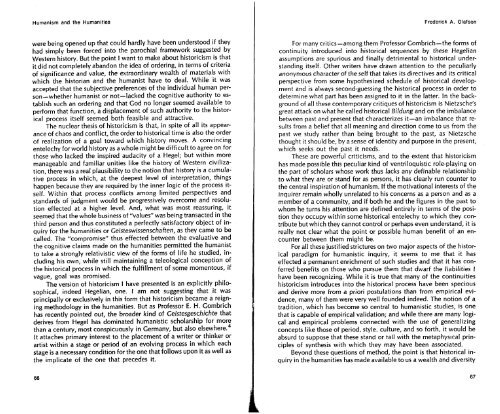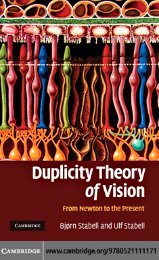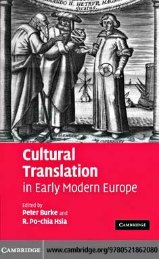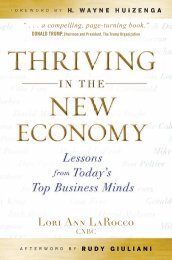Humanism and <strong>the</strong> HumanitiesFrederick A. Olafsonwere being opened up that could hardly have been understood if <strong>the</strong>yhad simply been <strong>for</strong>ced into <strong>the</strong> parochial framework suggested byWestern history. But <strong>the</strong> point I want to make about historicism is thatit did not completely abandon <strong>the</strong> idea <strong>of</strong> ordering, in terms <strong>of</strong> criteria<strong>of</strong> significance and value, <strong>the</strong> extraordinary wealth <strong>of</strong> materials withwhich <strong>the</strong> historian and <strong>the</strong> humanist have to deal. While it wasaccepted that <strong>the</strong> subjective preferences <strong>of</strong> <strong>the</strong> individual human person-whe<strong>the</strong>rhumanist or not-lacked <strong>the</strong> cognitive authority to establishsuch an ordering and that God no longer seemed available toper<strong>for</strong>m that function, a displacement <strong>of</strong> such authority to <strong>the</strong> historicalprocess itself seemed both feasible and attractive.<strong>The</strong> nuclear <strong>the</strong>sis <strong>of</strong> historicism is that, in spite <strong>of</strong> all its appearance<strong>of</strong> chaos and conflict, <strong>the</strong> order to historical time is also <strong>the</strong> order<strong>of</strong> realization <strong>of</strong> a goal toward which history moves. A convincingentelechy <strong>for</strong> world history as a whole might be difficult to agree on <strong>for</strong>those who lacked <strong>the</strong> inspired audacity <strong>of</strong> a Hegel; but within moremanageable and familiar unities like <strong>the</strong> history <strong>of</strong> Western civilization,<strong>the</strong>re was a real plausibility to <strong>the</strong> notion that history is a cumulativeprocess in which, at <strong>the</strong> deepest level <strong>of</strong> interpretation, thingshappen because <strong>the</strong>y are required by <strong>the</strong> inner logic <strong>of</strong> <strong>the</strong> process itself.Within that process conflicts among limited perspectives andstandards <strong>of</strong> judgment would be progressively overcome and resolutioneffected at a higher level. And, what was most reassuring, itseemed that <strong>the</strong> whole business <strong>of</strong> "values" was being transacted in <strong>the</strong>third person and thus constituted a perfectly satisfactory object <strong>of</strong> inquiry<strong>for</strong> <strong>the</strong> humanities or Ceisteswissenschaften, as <strong>the</strong>y came to becalled. <strong>The</strong> "compromise" thus effected between <strong>the</strong> evaluative and<strong>the</strong> cognitive claims made on <strong>the</strong> humanities permitted <strong>the</strong> humanistto take a strongly relativistic view <strong>of</strong> <strong>the</strong> <strong>for</strong>ms <strong>of</strong> life he studied, includinghis own, while still maintaining a teleological conception <strong>of</strong><strong>the</strong> historical process in which <strong>the</strong> fulfillment <strong>of</strong> some momentous, ifvague, goal was ~romised.<strong>The</strong> version <strong>of</strong> historicism I have presented is an explicitly philosophical,indeed Hegelian, one. I am not suggesting that it wasprincipally or exclusively in this <strong>for</strong>m that historicism became a reigningmethodology in <strong>the</strong> humanities. But as Pr<strong>of</strong>essor E. H. Gombrichhas recently pointed out, <strong>the</strong> broader kind <strong>of</strong> Geistesgeschichte thatderives from Hegel has dominated humanistic scholarship <strong>for</strong> morethan a century, most conspicuol~sly in Germany, but also e~sewhere.~It attaches primary interest to <strong>the</strong> placement <strong>of</strong> a writer or thinker orartist within a stage or period <strong>of</strong> an evolving process in which eachstage is a necessary condition <strong>for</strong> <strong>the</strong> one that follows upon it as well as<strong>the</strong> implicate <strong>of</strong> <strong>the</strong> one that precedes it.For many critics-among <strong>the</strong>m Pr<strong>of</strong>essor Combrich-<strong>the</strong> <strong>for</strong>ms <strong>of</strong>continuity introduced into historical sequences by <strong>the</strong>se Hegelianassumptions are spurious and finally detrimental to historical understandingitself. O<strong>the</strong>r writers have drawn attention to <strong>the</strong> peculiarlyanonymous character <strong>of</strong> <strong>the</strong> self that takes its directives and its criticalperspective from some hypo<strong>the</strong>sized schedule <strong>of</strong> historical developmentand is always second-guessing <strong>the</strong> historical process in order todetermine what part has been assigned to it in <strong>the</strong> latter. In <strong>the</strong> background<strong>of</strong> all <strong>the</strong>se contemporary critiques <strong>of</strong> historicism is Nietzsche'sgreat attack on what he called historical Bildung and on <strong>the</strong> imbalancebetween past and present that characterizes it-an imbalance that resultsfrom a belief that all meaning and direction come to us from <strong>the</strong>past we study ra<strong>the</strong>r than being brought to <strong>the</strong> past, as Nietzschethought it should be, by a sense <strong>of</strong> identity and purpose in <strong>the</strong> present,which seeks out <strong>the</strong> past it needs.<strong>The</strong>se are powerful criticisms, and to <strong>the</strong> extent that historicismhas made possible this peculiar kind <strong>of</strong> ventriloquistic role-playing on<strong>the</strong> part <strong>of</strong> scholars whose work thus lacks any definable relationshipto what <strong>the</strong>y are or stand <strong>for</strong> as persons, it has clearly run counter to<strong>the</strong> central inspiration <strong>of</strong> humanism. If <strong>the</strong> motivational interests <strong>of</strong> <strong>the</strong>inquirer remain wholly unrelated to his concerns as a person and as amember <strong>of</strong> a community, and if both he and <strong>the</strong> figures in <strong>the</strong> past towhom he turns his attention are defined entirely in terms <strong>of</strong> <strong>the</strong> position<strong>the</strong>y occupy within some historical entelechy to which <strong>the</strong>y contributebut which <strong>the</strong>y cannot control or perhaps even understand, it isreally not clear what <strong>the</strong> point or possible human benefit <strong>of</strong> an encounterbetween <strong>the</strong>m might be.For all <strong>the</strong>se justified strictures on two major aspects <strong>of</strong> <strong>the</strong> historicalparadigm <strong>for</strong> humanistic inquiry, it seems to me that it haseffected a permanent enrichment <strong>of</strong> such studies and that it has conferredbenefits on those who pursue <strong>the</strong>m that dwarf <strong>the</strong> liabilities Ihave been recognizing. While it is true that many <strong>of</strong> <strong>the</strong> continuitieshistoricism introduces into <strong>the</strong> historical process have been speciousand derive more from a priori postulations than from empirical evidence,many <strong>of</strong> <strong>the</strong>m were very well founded indeed. <strong>The</strong> notion <strong>of</strong> atradition, which has become so central to humanistic studies, is onethat is capable <strong>of</strong> empirical validation; and while <strong>the</strong>re are many logicaland empirical problems connected with <strong>the</strong> use <strong>of</strong> generalizingconcepts like those <strong>of</strong> period. style, culture, and so <strong>for</strong>th, it would beabsurd to suppose that <strong>the</strong>se stand or tail with <strong>the</strong> metaphysical principles<strong>of</strong> syn<strong>the</strong>sis with which <strong>the</strong>y may have been associated.Beyond <strong>the</strong>se questions <strong>of</strong> method, <strong>the</strong> point is that historical inquiryin <strong>the</strong> humanities has made available to us a wealth and diversity
Humanism and <strong>the</strong> HumanitiesFrederick A. Olafson<strong>of</strong> human experience and <strong>of</strong> symbolic orderings <strong>of</strong> experience by comparisonwith which <strong>the</strong> extension <strong>of</strong> <strong>the</strong> concept "man" in <strong>the</strong> earlierdays <strong>of</strong> humanism seems narrow indeed. Nor is this a merely quantitativegain that might be overbalanced by <strong>the</strong> diminished sense <strong>of</strong>attachment to one's own local tradition, as on occasion it may indeedhave been. Our widened range <strong>of</strong> comparative reference has changedin important ways our understanding <strong>of</strong> features <strong>of</strong> our own intellectualand artistic and moral tradition, as witness, <strong>for</strong> example, <strong>the</strong> work<strong>of</strong> E. R. Dodds on <strong>the</strong> status <strong>of</strong> <strong>the</strong> irrational within <strong>the</strong> Greek mind.'And as <strong>for</strong> fears that <strong>the</strong> burden <strong>of</strong> historical erudition inevitably has anegative effect on <strong>the</strong> fineness <strong>of</strong> apprehension and sensitivity todelicate nuances <strong>of</strong> feeling, it is reassuring to recall <strong>the</strong> example <strong>of</strong>Erich Auerbach, in which all <strong>the</strong>se attributes <strong>of</strong> <strong>the</strong> humanistic mindseem in such perfect ba~ance.~ <strong>The</strong> best examples <strong>of</strong> scholarly workalong historical lines in <strong>the</strong> humanities are very good indeed, and thissuggests that <strong>the</strong> historical paradigm does not stand so much in need<strong>of</strong> radical correction from some external source as it does <strong>of</strong> closercontact with its own best inspiration, as exemplified in <strong>the</strong> work <strong>of</strong>scholars such as those I have mentioned.At this point, it will be useful to draw into <strong>the</strong> discussion <strong>the</strong> twocounter-conceptions <strong>of</strong> <strong>the</strong> humanities to which I alluded at <strong>the</strong> outset.Both build on <strong>the</strong> critique <strong>of</strong> historical humanism and both movetoward a conception <strong>of</strong> <strong>the</strong> humanistic enterprise in which its specialorientation toward <strong>the</strong> past is subjected to quite drastic revision. But<strong>the</strong>n <strong>the</strong>y part company and resolve <strong>the</strong> ambiguities inherent in <strong>the</strong>historicistic compromise in utterly different ways. One <strong>of</strong> <strong>the</strong>se seeksto complete <strong>the</strong> objectification <strong>of</strong> humanistic inquiry. In order to doso, it is prepared to abandon virtually <strong>the</strong> whole person-based conceptualscheme <strong>of</strong> traditional humanism as well as any notion that cognitivelyresponsible inquiry might be <strong>the</strong> vehicle <strong>of</strong> existential or personalconcern. <strong>The</strong> o<strong>the</strong>r view, which I have described as visionary andprophetic, holds that <strong>the</strong> objectification <strong>of</strong> <strong>the</strong> humanities-<strong>the</strong>irtrans<strong>for</strong>mation into a research field and <strong>the</strong>ir resulting skewed relationshipto <strong>the</strong> primary vision <strong>of</strong> <strong>the</strong> creative artist and <strong>the</strong> seer-has alreadygone much too far. For <strong>the</strong> ambiguous compromise <strong>of</strong> historicism<strong>the</strong>y would substitute, not a yet more rigorously defined ideal <strong>of</strong>scholarship, but ra<strong>the</strong>r a direct vatic utterance by <strong>the</strong> humanist.I do not think it is fanciful to suggest that both <strong>of</strong> <strong>the</strong>se counterinterpretationsare straining, though in opposite directions, against<strong>the</strong> boundaries <strong>of</strong> <strong>the</strong> conceptual domain which, I have suggested, hastraditionally been <strong>the</strong> domicile <strong>of</strong> humanism, that is, <strong>the</strong> teleologicallyorganized Lebenswelt that was separated out <strong>of</strong> <strong>the</strong> organic cosmos<strong>of</strong> myth at an early date. <strong>The</strong> visionary interpretation would, if I under-stand its spokesmen correctly, undo that conceptual revolution, andby restoring <strong>the</strong> integrity <strong>of</strong> <strong>the</strong> world <strong>of</strong> myth, incorporate human lifeonce again into a wider cosmic life. <strong>The</strong> objectifying interpretationwould subvert <strong>the</strong> Lebenswelt in a quite different way by applying to itcategories and methods <strong>of</strong> inq~iry that definitively prescind from <strong>the</strong>basically teleological <strong>for</strong>ms <strong>of</strong> crder that have been <strong>the</strong> substance <strong>of</strong>humanism. What is especially striking is <strong>the</strong> common hostility to"manu-homo humanus, who is at once <strong>the</strong> denizen and <strong>the</strong> demiurge<strong>of</strong> <strong>the</strong> human world-that runs through <strong>the</strong> rhetoric <strong>of</strong> <strong>the</strong>se o<strong>the</strong>rwiseso pr<strong>of</strong>oundly different schools <strong>of</strong> thought. It is as conspicuous in <strong>the</strong>writings <strong>of</strong> Michel Foucault as it is in those <strong>of</strong> Martin Heidegger.7Such characterization and assessment <strong>of</strong> <strong>the</strong>se views as I can <strong>of</strong>fermust be extremely condensed8 <strong>The</strong> secession from humanism in <strong>the</strong>direction <strong>of</strong> a scientific objectivism is clearly motivated by a feelingthat <strong>the</strong>re is something shallow about <strong>the</strong> humanist conceptualscheme, that it is lacking in <strong>the</strong>oretical power, that it is, in Spinoza'sphrase, an asylum <strong>of</strong> ignorance. Such charges are not new. Attacks onfinal causes and <strong>the</strong> whole apparatus <strong>of</strong> teleological explanation <strong>for</strong>medan important part <strong>of</strong> <strong>the</strong> elaboration <strong>of</strong> <strong>the</strong> modern scientific concept<strong>of</strong> method. Nor are precedents lacking <strong>for</strong> <strong>the</strong> ef<strong>for</strong>t to expel <strong>the</strong>se<strong>of</strong>fending concepts from <strong>the</strong> sciences <strong>of</strong> man as well. Although <strong>the</strong>ef<strong>for</strong>ts that have been made to apply <strong>the</strong> insights <strong>of</strong> a Marx or a Freudto <strong>the</strong> analysis and interpretation <strong>of</strong> literature and art may not, as manycommentators have noted, have been wholly successful in abstractingfrom <strong>the</strong> finalism and even <strong>the</strong> moralism <strong>of</strong> <strong>the</strong> older humanist, <strong>the</strong>recan be no doubt that <strong>the</strong>y have displaced <strong>the</strong> focus <strong>of</strong> interest fromconscious intention and <strong>the</strong> language in which it expresses itself tostructures and relationships which, if <strong>the</strong>y do not absolutely transcend<strong>the</strong> Lebenswelt, have at best a problematic status with respect to it.Never<strong>the</strong>less, ef<strong>for</strong>ts to transfer biological and economic categories to<strong>the</strong> internal analysis <strong>of</strong> <strong>the</strong> discursive and imaginative structures withwhich <strong>the</strong> humanities deal have always been marked by a certaincrudity. In practice this fact has assured a large measure <strong>of</strong> continuingautonomy <strong>for</strong> <strong>the</strong> humanistic kind <strong>of</strong> internal analysis that isstill conducted in a language that is conceptually much closer to that<strong>of</strong> <strong>the</strong> works under study.What is new, however-and I refer here to current structuralisttendencies in <strong>the</strong> humanities that are already immensely influential inEurope and are gaining ground here-is <strong>the</strong> attempt to undertake <strong>the</strong>task <strong>of</strong> <strong>the</strong> internal analysis <strong>of</strong> discourse with a set <strong>of</strong> concepts that arenot drawn from independent sciences like psychology or biology norfrom <strong>the</strong> conceptual repertory <strong>of</strong> humanism as I have presented it.While <strong>the</strong>se concepts have no single source and may at times betray
- Page 1 and 2: THEOther books published in coopera
- Page 3 and 4: ContentsIntroductionSidney HookxiGE
- Page 5 and 6: IntroductionSidney HookNew York Uni
- Page 7 and 8: GENERAL EDUCATION -CHALLENGEAND JUS
- Page 9 and 10: General Education and the Universit
- Page 11 and 12: General Education and the Universit
- Page 13 and 14: General Education and the Universit
- Page 15 and 16: General Education and the Universit
- Page 17 and 18: General Education and the Universit
- Page 19 and 20: General Education and the Universit
- Page 21 and 22: General Education: The Minimum Indi
- Page 23 and 24: General Education: The Minimum Indi
- Page 25 and 26: General Education: The Minimum Indi
- Page 27 and 28: On Reviving Liberal Education-inthe
- Page 29 and 30: On Reviving Liberal Education-in th
- Page 31 and 32: On Reviving Liberal Education-inthe
- Page 33 and 34: Humanism and the HumanitiesFrederic
- Page 35 and 36: Humanism and the HumanitiesFrederic
- Page 37 and 38: Humanism and the HumanitiesFrederic
- Page 39: Humanism and the HumanitiesFrederic
- Page 43 and 44: Humanism and the HumanitiesFrederic
- Page 45 and 46: Justifying the HumanitiesRonald Ber
- Page 47 and 48: Observations on Humanism and Histor
- Page 49 and 50: Observations on Humanism and Histor
- Page 51 and 52: The Language and Methods of Humanis
- Page 53 and 54: The Language and Methods of Humanis
- Page 55 and 56: The Language and Methods of Humanis
- Page 57 and 58: Science, Science Teaching, and Rati
- Page 59 and 60: Science, Science Teaching, and Rati
- Page 61 and 62: Science, Science Teaching, and Rati
- Page 63 and 64: Science, Science Teaching, and Rati
- Page 65 and 66: Science, Science Teaching, and Rati
- Page 67 and 68: In Defense of Scientific Knowledgei
- Page 69 and 70: In Defense of Scientific KnowledgeE
- Page 71 and 72: The Uses and Limitations of Science
- Page 73 and 74: The Uses and Limitations of Science
- Page 75 and 76: The Uses and Limitations of Science
- Page 77 and 78: Multilevel Teaching of the Natural
- Page 79 and 80: The Social Sciences in Liberal Educ
- Page 81 and 82: The Social Sciences in Liberal Educ
- Page 83 and 84: The Social Sciences in Liberal Educ
- Page 85 and 86: The Social Sciences in Liberal Educ
- Page 87 and 88: The Economist Among the Social Scie
- Page 89 and 90: The Economist Among the Social Scie
- Page 91 and 92:
Social Science and General Educatio
- Page 93 and 94:
A Role for Social Science?Robert L.
- Page 95 and 96:
Experiential Educationand Revitaliz
- Page 97 and 98:
Experiential Education and Revitali
- Page 99 and 100:
Experiential Education and Revitali
- Page 101 and 102:
Experiential Education and Revitali
- Page 103 and 104:
Experiential Education and Revitali
- Page 105 and 106:
Experiential Education and Revitali
- Page 107 and 108:
Education for the Future: The Liber
- Page 109 and 110:
Education for the Future: The Liber
- Page 111 and 112:
The Desirability of Pulling in One'
- Page 113 and 114:
On Sharpening the HornsSidney Hooki
- Page 115 and 116:
~ The Humanities as Scholarshipand
- Page 117 and 118:
The Humanities as Scholarship and a
- Page 119 and 120:
Questions of Viability in Nontradit
- Page 121 and 122:
On Interdisciplinary EducationHowar
- Page 123 and 124:
On Interdisciplinary EducationHowar
- Page 125 and 126:
The Logic of the Social Sciences: T
- Page 127 and 128:
The Logic of the Social Sciences: T
- Page 129 and 130:
The Logic of the Social Sciences: T
- Page 131 and 132:
A Pro~osal for a New Division of th
- Page 133 and 134:
A Proposal for a New Division of th
- Page 135 and 136:
New Beginnings in General Education
- Page 137 and 138:
Thoughts on a Social-Science Curric
- Page 139 and 140:
Thoughts on a Social-Science Curric
- Page 141 and 142:
Thoughts on a Social-Science Curric
- Page 143 and 144:
Thoughts on a Social-Science Curric
- Page 145 and 146:
The Specter at the Feastevaluated.
- Page 147:
ContributorsContributorsLearned Soc















